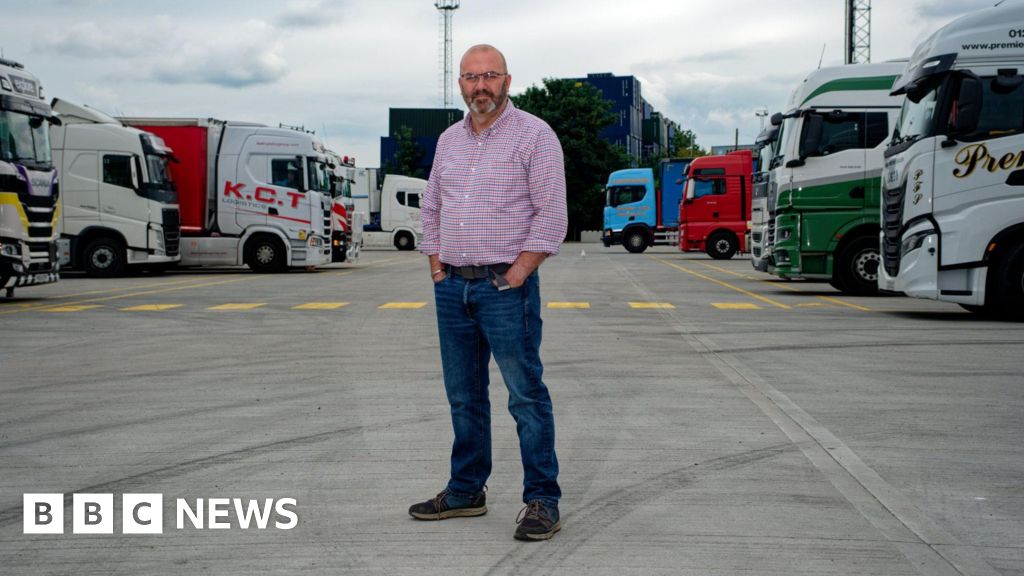51 minutes agoLaurence Cawley,BBC News, in FelixstoweBBCMatt Dangerfield is a former truck driver and co-owner of Felixstowe Truckstop"Everything, apa
Laurence Cawley,BBC News, in Felixstowe
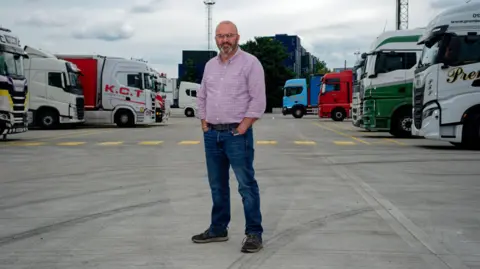 BBC
BBC“Everything, apart from babies, is brought to you by a lorry,” says haulier Graham Barnes. Parked up a stone’s throw from the Port of Felixstowe, the UK’s biggest container port, what do drivers like Mr Barnes want politicians to know ahead of the General Election?
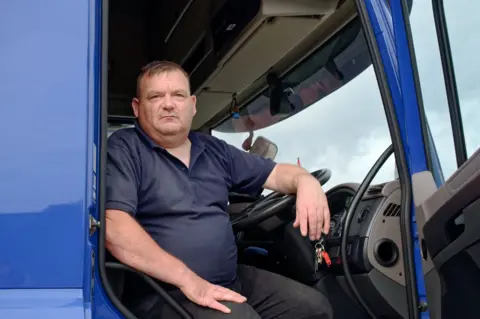
More than 250,000 hauliers crisscross the nation’s roads keeping the UK economy running.
Mr Barnes, who has driven from Wolverhampton in the West Midlands and will be spending a few hours to get some rest at the recently-opened Felixstowe Truckstop, is one of them.
He says despite the pandemic laying bare the vital importance of haulage to life in the UK, lorry drivers continue to face a shortage of safe places to stop, difficulties accessing medical care and other services while away from home and poorly maintained roads.
These were issues raised by all of the lorry drivers who spoke to the BBC about what they want politicians to get sorted. Some, such as Mr Barnes, also called for better policing on the roads to crack down on rogue drivers who, they say, put themselves and others at risk on highways.
“Our roads are so backwards,” says Mr Barnes, who wants a ban on hard shoulders being used as carriageways.
“The politicians need to be getting safe and secure facilities for lorry drivers,” he says. “It doesn’t need to be the Ritz or anything, it just needs to be safe and secure.”
He warned of the largely hidden issue of lorry driver diets and their long-term health implications.
“Drivers don’t often eat a healthy, balanced diet,” he says. “There are hardly any places for us to stop, motorway services hardly ever sell proper food these days, it is all takeaway food.
“It will affect our health, which will affect our driving on the roads,” he says.
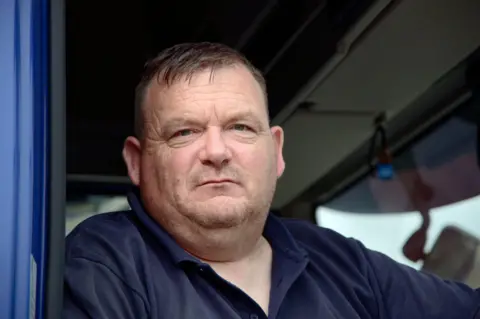
He says he wants politicians to see first hand the impact of the rising cost of living.
“I’d like politicians to actually listen to the taxpayer and experience what taxpayers are going through,” he says.
“I’d like a politician to get his debit card on a Friday, to think ‘right, I’ve worked hard all week, I’ll have two beers and a bag of chips’ and to then wonder whether they actually have enough money to afford it.”
He would also like an end to politicians having second homes. Instead, the state could compulsory purchase a London hotel and give MPs a room there – a truck stop for parliamentarians, if you will.
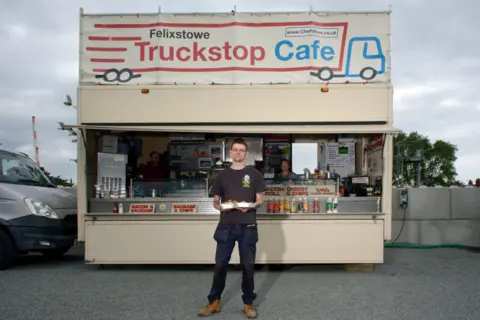
Lewis Elder, 25, from Perth in Scotland, is at the end of a “wee trek” to get to Felixstowe and has just ordered a freshly-made Jamaican chicken meal from the Truckstop Cafe.
“Politicians seem to think they know everything,” he says. “But they’ve not stepped in our shoes and actually felt how we feel.
“At the end of the day not many people care about us – and yet we are the people who keep the country going.”
Like Mr Barnes, Mr Lewis says getting more proper truck stops is a “big thing” for all drivers.
He describes the current state of the nation’s roads as “appalling” and says while he can deal with errant drivers, roadworks seem to be a growing and never-ending issue.
“They’ll either close the road completely or they are just taking so long to finish,” he says. “For us, roadworks leave us constantly trying to catch up.”
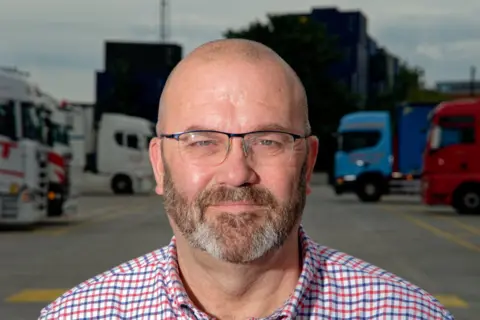
Matt Dangerfield, co-owner of Felixstowe Truckstop, says Felixstowe, which has between 4,000 and 5,000 lorry visits each day, is essential to both the local and national economy.
He says the journey times of lorry drivers is often hugely dependent on the flow of traffic over the Orwell Bridge at nearby Ipswich.
“The closing of the Orwell Bridge, when there is either a police incident or high winds, can cause an extra three or four hours to a lorry driver’s journey,” he adds.
He says the ring road around Ipswich is “full of roundabouts” and “designed in the 1960s”.
“Politicians need to invest in the infrastructure because without haulage the economy will not be delivered,” he says.
“They need to invest in facilities for lorry drivers, many of whom are out on the road all week.”
Mr Dangerfield says many of the UK’s truck stops have “slowly disappeared” over the years because of the rising value of land, which has meant landowners can make far more money from warehousing or home-building than facilities for truckers.
“I know compared with the NHS and education and so on, transport infrastructure is down the pecking order – I get it,” he says, “but this will boost the economy and will help attract people into the industry.”
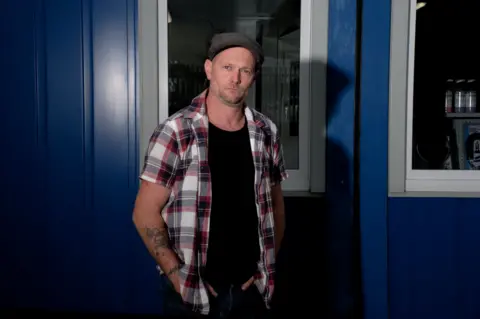
Steve Pole, who has travelled from Great Dunmow in Essex to Peterborough in Cambridgeshire and then to Felixstowe, has “had enough” of life as a haulier.
Selfish motorists, congestion, out-order-toilets and the current roadworks on the M25, A12, the A1, the M1 and the A14, he says, are just some of the issues he faces daily.
“As for the Dartford Crossing,” he says, “if anything breaks down you’re there for [what feels like] days. It just goes on and on and on. It never stops.
“I don’t know what politicians can do to be honest.”
One suggestion he has is encouraging more people to work from home to lower congestion on the roads.
“If you’ve got a big office block of people and they could all do that work at home, why have they all got to go suited and booted in their cars, drive like idiots, block up the roads to go and sit in an office block to please their manager?
“If I could go and work in Europe now, I would – the roads are better, the facilities are better, the foods better, you can get further and the scenery is better.”

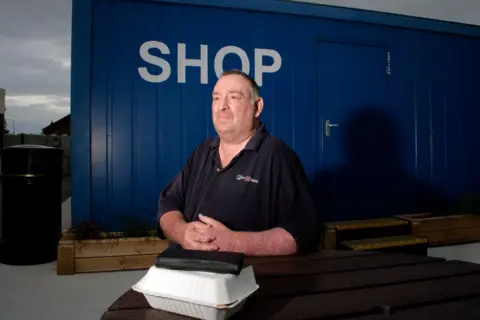
Former Army medic Dave Hall says he would like politicians, and the general public, to have a greater understanding about the lives of people who work away from home.
For example, Mr Hall, who is a grandfather, lives alone and is rarely at home on Thursdays, when the bins are collected.
Getting a GP appointment, he says, becomes a masterclass in timing and he risks losing a day’s pay.
He says he would like politicians to address the issue of GP access for those who work away, perhaps by ring-fencing weekend appointments for patients like him.
“When I leave my house on whatever day it is I don’t know when I am coming back – which is fine, that’s the job I have signed up for.
“But it is frustrating, because people don’t know what truck drivers do. We have added pressures to get things done.
“Politicians need to consider things like parking we are losing lots, access to the NHS, a lot of lorry drivers have diabetes.
“The road works are horrendous – what I don’t understand is the length of the roadworks.
“What I don’t understand is they put these signs up saying ‘you might not see us working but we’re working at night’.
“I’m up and down those motorways at 03:00 and I am still not seeing anybody working!”
www.bbc.com
